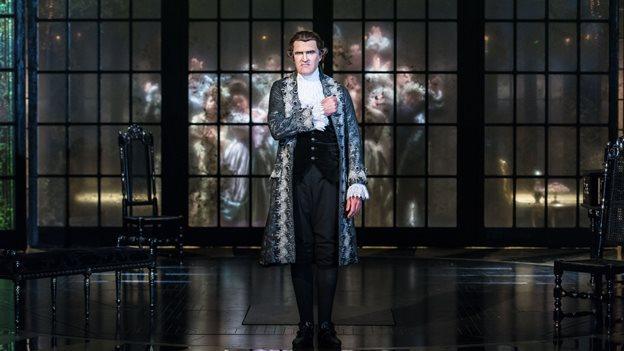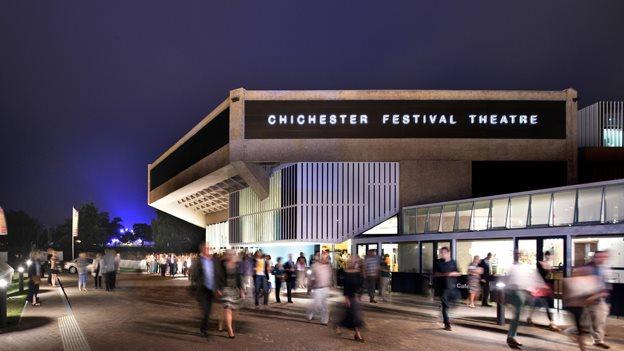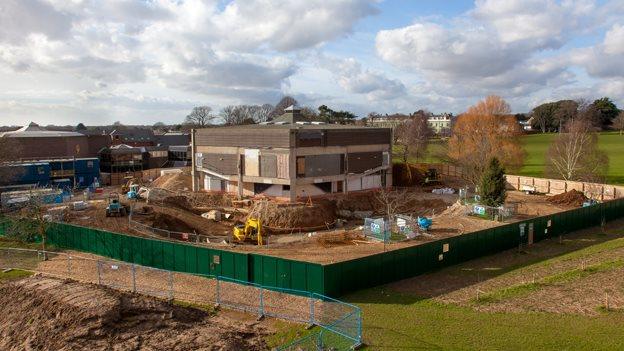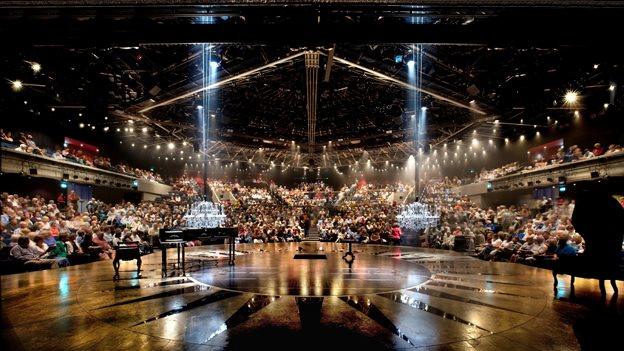Chichester Festival Theatre 'ready for next 50 years'
- Published

Rupert Everett stars as Salieri in the re-opening production, Amadeus
One of the largest theatres in southern England has officially reopened after a £22m revamp.
The first play in the main 1,300-seat auditorium is a new production of Peter Shaffer's Amadeus, starring Rupert Everett as Salieri and Joshua McGuire as Mozart.
Shaffer, 88, will be in the audience for the play's opening night on Friday.
Artistic director Jonathan Church said the theatre had been "future-proofed" for audiences for the next 50 years.
With its distinctive Grade Two* listed hexagonal structure, Chichester Festival Theatre first opened its doors in 1962 under the artistic leadership of Laurence Olivier.
"This building wasn't built by a politician or the Arts Council," Church said. "It was built by local people - and that engagement has been what enabled us to celebrate 50 years."

A new extension housing significantly improved backstage facilities for actors

The extensive revamp took two years

The venue has a completely new stage
The 50th anniversary in 2012 marked the launch of fundraising for the £22m development project.
Church added: "Although we've had the amazing support of the Arts Council and the local authorities, once again businesses and individuals in this community have made this theatre what it is today and will give it another 50 years."
Church, who was appointed in 2006, has overseen a remarkable revival of the theatre's fortunes. Audiences have surged from 51% capacity in 2005 to 88% in 2013.
Recent London transfers include The Pajama Game and Another Country. Singin' in the Rain is on a UK tour and Barnum - which opened in Chichester's temporary tent last summer - begins a UK tour in this autumn.
With the giant tent now gone, the revamped main auditorium has a new stage floor and extended behind-the scenes areas.
"There were many technical challenges - we've put a building the same size again on the back," said executive director Alan Finch.
The wooden boards of the original stage, once trod by Olivier, are now in the green room used by cast and crew.
For audiences there are improved lines of sight, bigger foyer areas - and twice as many toilets.

Amadeus will be followed by a production of Peter Shaffer's Black Comedy and a series of readings by Simon Callow
Church said Amadeus was the "perfect play" to open the new season in the refurbished theatre.
It comes nearly 50 years after the Chichester premieres of Shaffer's The Royal Hunt of the Sun and Black Comedy.
"Nobody wrote plays for this kind of large stage better than Peter Shaffer," said Church.
"Amadeus is an opera in many ways - with Mozart's music as another major character."
The £22m renewal project received £12m from Arts Council England, plus £8m in pledges from businesses, trusts and individuals.
West Sussex County Council and Chichester District Council pledged £1.5m and £500,000 respectively. Support was also received from the Heritage Lottery Fund.
Finch says the theatre annually contributes more than £17m to the local economy.
The redevelopment was undertaken by architects Haworth Tompkins, whose work includes the redesign of London's Royal Court Theatre, Liverpool's Everyman Theatre and The Shed at the National Theatre.
"My first experience as an audience member was walking into this auditorium and the hairs going up on the back of my neck," Church recalled.
"I didn't know a regional theatre of this scale and ambition existed."
He said Chichester was now in line with the best of the theatres built at the end of the 20th Century.
"We've future-proofed it," he said.
"What we and successive managements have to do in the next 50 years is make sure the programme entices people into what is now a wonderful building."
- Published7 March 2014

- Published12 May 2014
